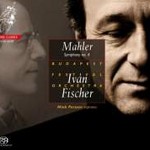
Mahler: Symphony No. 4 in G major
 $43.00
Out of Stock
$43.00
Out of Stock6+ weeks add to cart
GUSTAV MAHLER
Mahler: Symphony No. 4 in G major
Budapest Festival Orchestra / Ivan Fischer (conductor)
[ Channel Classics SACD / SACD ]
Release Date: Sunday 1 March 2009
This item is currently out of stock. It may take 6 or more weeks to obtain from when you place your order as this is a specialist product.
Gramophone Award Finalist 2009: Orchestral
"What no one will deny is the amazing unanimity and precision of the playing here and the superlative quality of the sound engineering. …the Scherzo goes wonderfully well, with solo violin and clarinets in particular excelling themselves. In the finale, Fischer achieves novelty chiefly through understatement, mindful of the need to avoid coyness at all costs. Miah Persson is ideally cast and as she invokes Saint Martha...it's as if we're transported to a small village church, the organ made tangible in the exquisite treatment of the accompanying instrumental texture." Gramophone Magazine, April 2009
"…Fischer's feeling of the Symphony's supple architecture, his ability to caress a phrase or point out a delicious colour without losing the sense of the larger flow, make this one of the most musically satisfying recordings to appear in a long time - worthy to put beside the great Jascha Horenstein / Margaret Price 1970 version, but in spirit wholly individual." BBC Music Magazine, April 2009 *****
"Unlike some heavy-duty Mahlerians, Fischer and his wonderful Budapest band don't overplay the nightmarish episodes. In the opening movement, Fischer lingers on exquisite instrumental detail without halting the music's momentum. The soprano Miah Persson is angelic in the finale." Sunday Times
"It's a provocative, iconoclastic performance, and highly recommended." The Guardian, 13th March 2009 *****
"What no one will deny is the amazing unanimity and precision of the playing here and the superlative quality of the sound engineering. But how to read a work that can feel brittle as well as heart-warming and graceful? Despite Iván Fischer's eminently sane and central pacing overall, he courts controversy with inconsistencies of tone between (and individualised inflexions within) the four movements.
Some maestros choose between neo-classical modernity and old-world Gemütlichkeit. Fischer gives us both and more: he gives us instability.
Rather than taking his cue from the opening bars in which the jingling sleigh bells might be construed to lose their way, Fischer mixes them down, introducing his own eccentric nuance a fraction later. He permits an oasis of exquisite repose just before the movement's final flourish yet much of the rest is unsettling. While details unearthed are revelatory - often linear, maybe functional, certainly more than merely illustrative - the quest can seem obsessive, at odds with the sense of ease indicated by the composer.
Make no mistake however, the playing has character and conviction, the divided violins enhancing transparency albeit at some expense of weight and blend. Less self-regarding or at least less wilful since the idiosyncrasies are intrinsic, the Scherzo goes wonderfully well, with solo violin and clarinets in particular excelling themselves.
The slow movement is just a little pale, as if Fischer were deliberately avoiding the calculated sublimity and cushioned string tone associated with big-band performances of late Beethoven. The gates of Heaven are flung open with a great blare, possibly a bit much for home listening but replicating the immediacy of the concert hall. In the finale, Fischer achieves novelty chiefly through understatement, mindful of the need to avoid coyness at all costs. Miah Persson is ideally cast and as she invokes Saint Martha it's as if we're transported to a small village church, the organ made tangible in the exquisite treatment of the accompanying instrumental texture. This is just one of countless imaginative touches on an exceptional hybrid SACD." Gramophone Classical Music Guide, 2010



